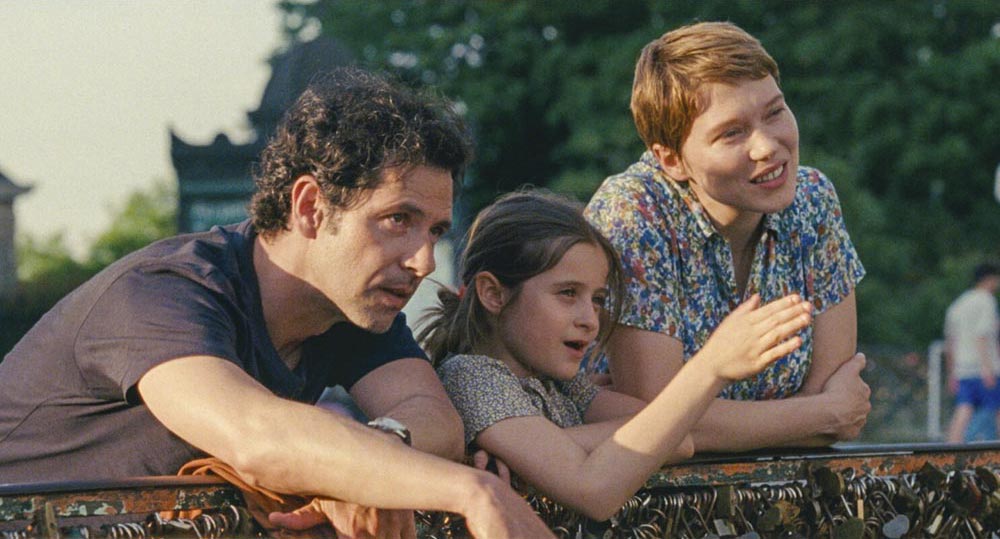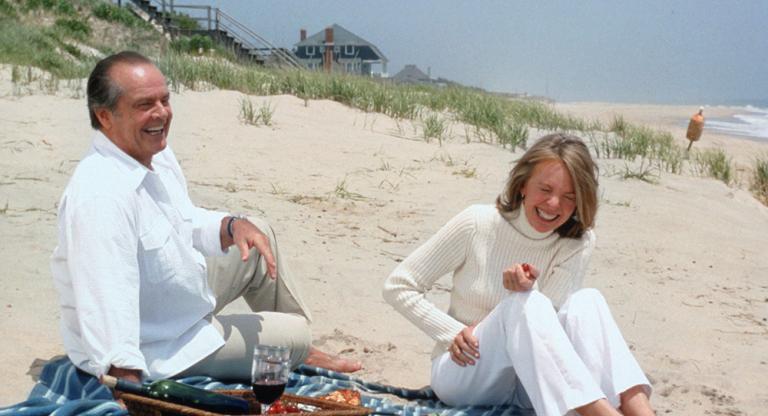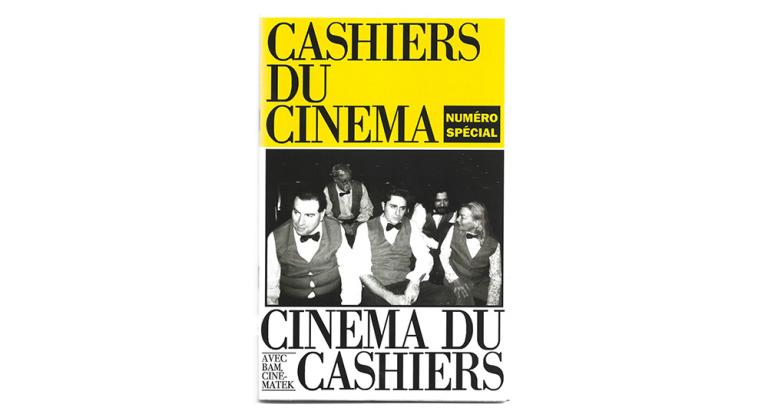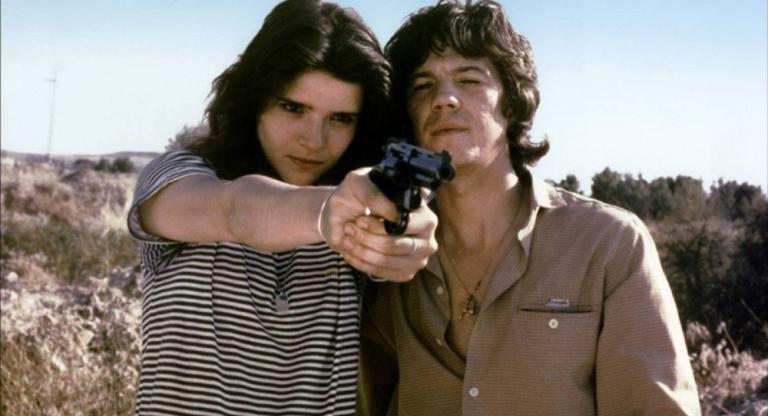There are few filmmakers who approach the difficulties of life with such a light touch as Mia Hansen-Løve. Over the course of eight feature films she has built an extraordinary body of work composed of deeply meditative portraits of humanity. Her latest work of autofiction, One Fine Morning (2022), is a gentle slice-of-life study of a woman at a turning point. Set amidst the bustling city of Paris, it stars a transcendent Léa Seydoux as Sandra, a thirty-something widow, mother, and interpreter who experiences two distinct life-changing events that collide: the declining health of her professor father, Georg (Pascal Greggory), as he struggles with a neurodegenerative disease and comes to require an assisted-living facility; and a passionate affair with Clément (Melvil Poupaud), an old friend who feels stuck in a loveless marriage.
Hansen-Løve loosely draws from her own life to craft a delicate film—mundane, yet profoundly affecting—reminiscent of her earlier works, such as Goodbye, First Love (2006), Father of My Children (2009), and Things to Come (2016). Ahead of One Fine Morning’s theatrical release, Hansen-Løve spoke to me about Seydoux’s magnetic presence, the confines of Paris, and the idea of artistic transmission.
Jihane Bousfiha: You have said that you felt you had to write this film out of necessity. How emotional or challenging was it to reflect upon your own experiences—which were still so fresh at the time of writing—and shoot in the same hospitals and nursing homes that your own father stayed in?
Mia Hansen-Løve: It’s already a little bit far away now—at least the writing process—but it was probably emotional. When I wrote [One Fine Morning], it wasn’t easy because it meant going back to those moments, those scenes that were painful to live. But on the other hand, whenever I start writing something for a film it becomes fiction to me, even though some scenes in the film can be close to my own experience. As soon as I put it on paper and I think of an actress or actor, that brings distance. I think it’s somehow why I made those films, too. It’s to find that distance that I cannot have in my life otherwise. It is emotional in some ways, but I would also say that it actually helps [with] dealing with that kind of pain the film is about in a better way.
I think my films have always helped me become a bit wiser, in a way. I remember when I got the most emotional was when I visited the hospitals again for the first time for the film. That was not when I was shooting, just when I was preparing, and I remember that moment where I got very emotional. But then I would say the same thing I just said about the writing, like going back there with the actors. Even though some scenes can be very close to the original scenes that I experienced with my father in those places—well, then it becomes even like a game. There is something childish about making films. When you are replaying some things that were originally very difficult to live—when you have actors play them—it’s funny somehow, whatever the scenes are about. I guess that’s why I make films, too. It’s in order to transform some experiences of your life that were maybe horrible to live into something almost funny. Of course, it wasn’t only funny to watch and experience, but still it was healing to me. There is something deeply cathartic about shooting those scenes in the very same place where my father was.
In a way you get rid of [the emotions]. That could almost even bring some kind of guilt feeling, because when you make the film and put all these experiences and transform them into fiction, and have them played by actors and bring it to the audience, it’s a way to bring distance between you and those experiences and get to turn the page, or at least get rid of them in some ways.
JB: Léa Seydoux is an actress who has become much more recognized for her flashy Hollywood roles, so it’s quite rare to see her be as understated and normal as she is here. She fully disappears into the role of Sandra. I read in the press notes that you wrote the role with her in mind. What was it about Léa that drew you to her?
MH-L: I think she's the French actress of her generation who impresses me the most. That was the case for a long time, but I did not have a chance to offer her a part earlier. There is something magnetic about her, but in addition to that, there is also a sadness about her presence on screen that actually touches me a lot. I don’t know how much she’s aware of that, and I don’t know if it has anything to do with her success—maybe it does. I don’t think the guys who picked her for James Bond were interested in the kind of sadness that radiates from her. There is something about that for me, but not something that would be in any way acted or artificially created by her. It belongs to her and has nothing to do with acting; it’s just part of who she is. It doesn’t mean that she’s a sad person in life at all, but it’s just that she carries this emotion with her. When it expresses itself, when you film her, you never know when she’s acting and when it’s just her being sad, and that’s something quite unique about her presence on screen.
There is a very direct access to that deep sadness that seems to come from childhood or something like that, or at least that’s the way I feel about her presence on screen. It’s something that has always moved me ever since I saw her in films, especially the first films where I saw her—Rebecca Zlotowski’s film Belle Épine (2010), and then there was Christoph Honoré’s film [The Beautiful Person, 2008]. Her way of acting is so raw. There is such a simplicity, a minimalism about the way she acts. She never overacts, she’s never affective; she’s very restrained. I think it’s something that some French spectators may not like because she doesn’t try to seduce the public, she doesn’t try to be loved. She’s very seductive, of course. As a woman, she’s very glamorous in many films. But she’s not [like] some actors [who] really act in a way where you can feel they want to be loved by the public.
There is something about her that escapes us, she’s not giving us everything. She’s not putting her heart in her hands and giving it to us, there is something restrained about her presence [that] I love. I love the minimalism of her acting. That is always what I’ve been trying to find with actors. When I was working with her on set I felt I didn’t have to do anything. Usually when I work with actors I’m trying to get rid of all intentions and have them play in the simplest way possible, because that’s what feels the most true to me. But Léa, she’s just like that. It feels like she doesn’t act, she’s just being the character, and that’s very impressive to me.
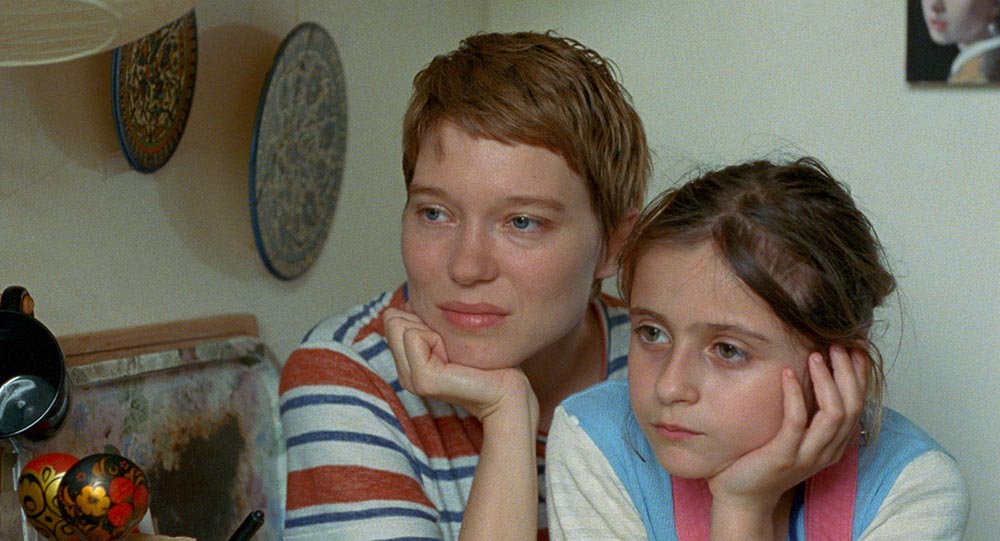
JB: What made you want to tell a story about infidelity that shows the opposite point of view of what you explored in Things to Come, with Léa essentially playing the other woman here?
MH-L: I don’t think there is a good side or a bad side of virtue, or like a side of evil or a side of good when it’s about love stories. It’s just about being left alone or being in love, and romances where you find somebody [and] it works and there is a future possible or some other stories are over and you are being left alone. It’s the cruelty of life. It’s not as if in Things to Come I was on one side judging and looking at the other side and saying, This is mean, this is bad, and she’s the victim, and then I would cross the river and say, Oh no, actually, she’s the victim, because I don’t look at characters this way. I’m having empathy for a character that I’m doing a portrait of, and whatever happens I feel close to her because of this empathy. In Things to Come I had empathy for a woman who was being left alone and had to deal with that. In this case, it’s a woman who falls in love with a man who already has a woman in his life and has to leave this woman—or not leave her, but at least make a decision—[before] she can be with him. Just as you said, she’s on the other side. But in the end, it’s also about loneliness. [laughs] There is a lot of loneliness involved in that story, too, just as there was in Things to Come. It’s about the question of the possibility of happiness, too. Things to Come was stopping in a moment where Isabelle Huppert was still alone, but maybe in her future she will meet somebody and have a new love too—it’s different moments of life.
To me, Sandra’s father in One Fine Morning is like the same character as Isabelle Huppert in Things to Come. Now she has a man in her life, and she seems to be rather happy and full of energy. To me, it shows that this situation can change in a moment.
JB: There’s a throughline in your work about people, mostly women, who are on paths of finding themselves in the midst of pivotal events that are occuring in their lives. What is it about this journey that has continued to fascinate you?
MH-L: I think it has to do with the fact that all my films are about the way I see life as [being] in perpetual movement. They are also all portraits, but they are trying to capture the specific presence and beauty of a couple of characters. I’m trying to, through the means of cinema, capture their presence the way a painter would do but in a small cinematographic way which means dealing with time. On the other hand, I’m also trying to make films that deal with what life is to me, and I find life brutal and cruel. But what I find consoling about life is its variety and the fact that it’s always in movement and that there is always something that comes afterwards. Life doesn’t end the way film ends. I’m trying to make films, to write and direct them in a way that we feel that life is bigger than cinema.
JB: I noticed in this film that, unlike some of the characters in your previous work, Sandra is never given the opportunity to escape to the countryside. She is always on the move within Paris.
MH-L: That’s totally right. It was something painful for me about writing that film. It’s exactly what you just pointed [out]. Before that film, there was always a moment where I could escape my own story, in a way—the story I was telling or the difficulty of a situation. There was always a way for me to use nature, or flying to another place, or the country as a way of escaping some situation. As I always identify very much with the characters, it always helped me that there was a small amount of shooting where I would go in another place. It felt like [takes a deep breath] giving me some air. I don’t know if it’s because I did Bergman Island [2021] right before, and in Bergman Island the whole film was giving me air. It was all about escaping [and] being in the country, in the nature, and exploring something else.
I don’t know if it was in an act of self-punishment or something like that [not to leave the city in One Fine Morning]. More seriously, I think I felt that if I wanted to really reflect about that moment of Sandra’s life and her father’s life, I needed to focus in Paris and write the script in a way where we almost feel like prisoners of the city, where there is no escape. It’s something erratic where the character goes from one hospital to another hospital. But there is no paradise somewhere else. There is a short scene in the country, but it’s so short, and we don’t really see the nature. That was intentional, again, because I wanted the film to really focus on this harsh Parisian life that Sandra has, but especially that her father has, and what it means to be sick in this environment.
JB: In a way, her relationship with Clément is a refuge for her, and even that has all of these issues ingrained within it.
MH-L: That’s the real refuge of the film, exactly. It couldn’t be nature the way it was in my previous films. The only real escape for her was basically that passion and sex, but I would say it’s actually more interior. It was a way to say that’s the only place where she can really escape from her father’s disease and the brutality of what’s happening to her and of seeing her father in this condition. The escape for her was this romance.
JB: It’s mentioned at the end of the film that Georg always wanted to write an autobiography titled Un Beau Matin, which is where the film’s title comes from. And here you have made a film that’s inspired by an experience that had a profound impact on you. Could you talk about the way that this mirroring reflects your own relationship with filmmaking?
MH-L: Sandra found in Georg’s notebook the title of a book that we don’t know if he really has written, but he wanted to write about his childhood and the suicide of his father. It’s more suggested that he never did write that book. You’re right, there is a metaphor here to me with the fact that I use the same title for the film [as] the one that Georg had for the book he never wrote. There is this idea of transmission, it’s as if the film was filling a void. There is the unwritten book by Sandra’s father, but then there is the film.
I feel the same as my father—to be more direct about it. You always tell yourself stories about why you are who you are, and the connection that it has with your family background. In my case, the story I’ve been telling since I started making films was that my father should have been a writer, and he could never for many reasons; he was empêcher [prevented]. He couldn’t—he had to work, to make money. It was because there was a lack of freedom that he didn’t have that chance to find the right space that he could become a writer, but he had the talent and sensibility for it, and I think he had the desire for it. He wrote extremely well, when I read his letters or even his philosophy lessons, he had what we call in French la plume. It means you had the talent of a writer, but he never wrote, and I think that must have been a huge frustration, even maybe suffering for that, and that always makes me sad. We were always encouraging him to write, and I always thought one day he would write a book about his life, and he never did. I’ve told myself that maybe it was thanks to him that I became— that he transmitted to me this artistic sensibility without even talking about it. Because I grew up in this environment, [with] this certain sensibility, and I think it transmitted something about it to me. For me, making films is my own way to be what my father could not be.
I think that’s why there is this allusion in my film. This connection between the title of the film and Georg’s book is the idea of a transmission from the father to the daughter.
One Fine Morning opens today, January 27, at Film Forum and Film at Lincoln Center.
